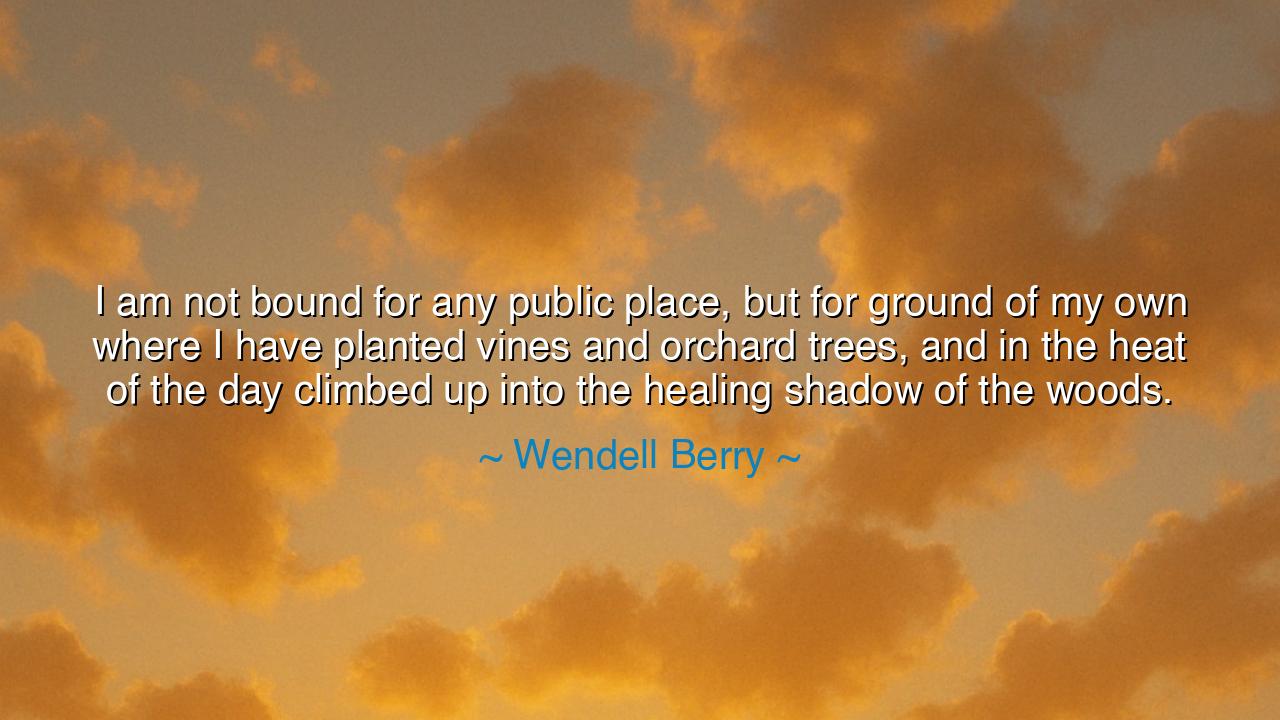
I am not bound for any public place, but for ground of my own
I am not bound for any public place, but for ground of my own where I have planted vines and orchard trees, and in the heat of the day climbed up into the healing shadow of the woods.






Wendell Berry once wrote: “I am not bound for any public place, but for ground of my own where I have planted vines and orchard trees, and in the heat of the day climbed up into the healing shadow of the woods.” In these words we hear not only the voice of a poet, but the cry of a prophet who has turned away from the noise of the world to find renewal in the soil of simplicity. He declares that his destination is not the clamor of the crowd, nor the vanity of public squares, but the quiet sanctuary of land, labor, and shade. It is a rejection of hollow ambition, and an embrace of a life rooted in nature and in one’s own honest work.
Berry, a farmer, philosopher, and poet of Kentucky, spent his life warning of the dangers of industrial greed and the alienation of man from the land. In this quote, he gives form to his lifelong truth: that true wholeness is not found in the applause of strangers, but in the patient tending of the earth, in the peace of the woods, and in the fruits of one’s own orchard. The public place is fleeting—it consumes and forgets—but the private ground, cultivated by steady hands, nourishes the body and the soul.
The ancients understood this wisdom well. The Roman statesman Cincinnatus, after serving his people with honor, did not remain in the halls of power. He returned to his farm, to his plow, content to labor in the earth rather than bask in glory. His strength lay not in ambition, but in contentment. His example mirrors Berry’s vision: the nobility of choosing one’s ground, of planting and resting in the shadow of trees rather than forever chasing honor among men.
Even in our own age, history reminds us of the danger of forgetting this truth. Many who sought fame in the public square found only exhaustion, corruption, or emptiness. Yet those who tended the “small things”—their families, their gardens, their inner lives—often discovered the deeper joy. Consider the story of Leo Tolstoy, who, after writing works that shook the world, turned toward the fields and sought in the simplicity of nature the peace that words alone could not give him. In his humble retreat, he found more healing than in all the salons of the world.
The teaching, then, is twofold. First: the public square is not evil, but it is fleeting. Applause dies quickly, but a tree planted with your own hands may outlive you and give fruit to generations. Second: healing is not found in endless striving, but in the shadow of the woods, in the sanctuary of creation, where man returns to his truest place as caretaker, not conqueror. To know when to turn away from the crowd and walk into the quiet is the mark of wisdom.
So what actions shall we take? Plant something with your own hands—a tree, a garden, or even a single vine. Create a space of stillness in your life where you may retreat from the noise of the public square. Let your soul breathe in the shadow of the woods, whether in an actual forest or in the quiet places of your heart. Choose not always the path of fame, but the path of fruitfulness.
Thus, Wendell Berry’s words endure as a call to all weary souls: leave the vanity of constant display, and return to the ground, to the orchard, to the woods where shadows heal and labor sanctifies. For the soil remembers what the crowd forgets, and the fruit of a single tree planted in love is worth more than the fleeting roar of a thousand voices in the public square.






AAdministratorAdministrator
Welcome, honored guests. Please leave a comment, we will respond soon